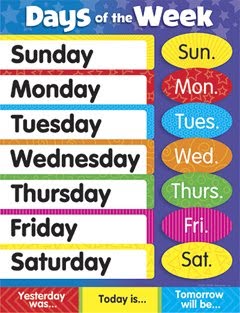
| There are seven days of the week. |
| Sunday is a day of rest for some people, but many people still have to work. |
| Quite a few people go to church on a Sunday. |
| On Monday morning, we go back to school after the weekend. |
| Many people say that they don’t like Monday because it is the beginning of the work week. |
| Tuesday is a school day and a working day. |
| I don’t think that there is anything special about a Tuesday. |
| Wednesday is the middle of the work week. |
| On Thursday, many of the stores and malls stay open later. |
| It gives you a chance to run some errands on a Thursday night. |
| On Friday, you feel like the work week is nearly over. |
| Some people say, “thank goodness it is Friday.” |
| They look forward to the weekend. |
| On Saturday, many people can sleep in late. |
| People get errands done on Saturday. |
| You see a lot of people in the grocery store on a Saturday. |
| Most children look forward to Saturday so that they can play with their friends. |
| Then, Sunday comes again. |
| The weeks turn into months, and the months turn into years. |
| Time goes by quite quickly. |
Exercise for this lesson:
- How many days are there in a week?
- What is Sunday often considered for some people, and what do many people do on Sundays?
- How do many people feel about Monday, and why?
- What kind of day is Tuesday described as?
- What is significant about Wednesday in relation to the work week?
- What happens on Thursday that allows people to run errands?
- How do people typically feel about Friday, and why?
- What is special about Saturday for many people?
- What do most children look forward to on Saturdays?
- What is the observation about time in the last part of the text?
Please comment your answers!
➡ Lesson 43 – Describing Things




